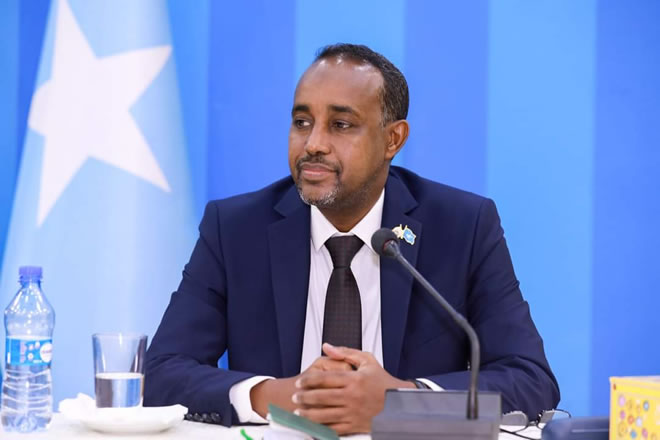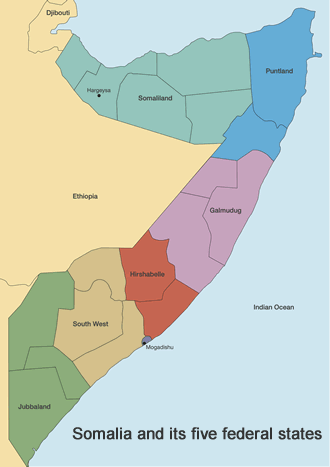by Selam Tadesse Demissie and Andrews Atta-Asamoah
Wednesday May 19, 2021
Does Prime Minister Roble have enough support and independence to ensure elections can be held at last?

Somali Prime Minister Mohamed Hussein Roble
First published by ISS Today
Somalia faces a political crisis because its leaders have been unable to hold elections after president Mohamed Abdullahi Mohamed’s term of office expired in February.
In the absence of elections, his term was extended for two years by the Lower House of the country’s Parliament in April. This decision was condemned by international partners and triggered protests and clashes in the capital Mogadishu later that month.
Mohamed, popularly known as Farmajo, has since backed down on the term extension. He has committed to a dialogue process and designated Prime Minister Mohamed Hussein Roble to oversee the implementation and security of the elections.
The president’s latest move has defused tensions and allowed the space for various actors to work towards reconciling stakeholders. But will the choice of Roble to spearhead the election process address the deadlock and pave the way for polls in Somalia?
Roble has promised not to take sides in the elections and has committed to delivering a credible poll acceptable to both sides of the political divide. However, since he was given the task by the president, some wonder if he can escape the influence of Villa Somalia. Another question is whether he can steer the election process with independence, given its high-stakes nature for the central government and the opposition.
The biggest challenge is the management of stakeholder trust in the elections. When he became president in 2017, Farmajo promised to work towards ‘one person, one vote’ rather than the clan-based indirect election, which brought him to office. However, inadequate preparations and al-Shabaab violence across Somalia in the latter part of his four-year term made it clear that universal suffrage wasn’t feasible.
The federal government of Somalia and the five federal member states then agreed on a revised election model. The new approach was based on the 17 September 2020 agreement that provides wider participation than previous elections.
However, implementation failed due to mistrust primarily between the federal government and member states. The latter worried about the central government’s interference in state-level politics and Farmajo’s perceived centralisation of power.
The lack of consensus on the type of federalism Somalia needs has made implementing the current election model difficult. While the federal government increasingly works towards more power at the centre, the member states prefer a more devolved approach.
Amid this dichotomy, the opposition and some federal states blame Farmajo for interfering with some states’ elections – notably in Hirshabelle, Galmudug and the South West regions. They also accuse him of creating tensions in the other states, particularly Jubaland. Here, central government opposition to Jubaland president Ahmed Mohamed Islaam Madobe in the 2019 elections soured relations between Mogadishu and Kismayo, Jubaland’s commercial capital.
Another source of mistrust has been the use of security forces against the opposition. In his four years of office, Farmajo has been accused of attacking the opposition, breaking up peaceful demonstrations and replacing airport security with a force known for attacking his opponents. He has also allegedly interfered with the security of Puntland and Jubaland delegations and side-stepped the Upper House of Parliament.
 Also, one of the reasons for the deadlock in implementing the September 2020 agreement is Jubaland’s security issue. The presence of Farmajo’s troops in one of the two cities in Jubaland where elections are to take place — Garbaharey in Gedo — is seen by the Jubaland leadership as an attempt to interfere with state-level polls.
Also, one of the reasons for the deadlock in implementing the September 2020 agreement is Jubaland’s security issue. The presence of Farmajo’s troops in one of the two cities in Jubaland where elections are to take place — Garbaharey in Gedo — is seen by the Jubaland leadership as an attempt to interfere with state-level polls.
Despite the cancellation of Farmajo’s presidential term extension, mistrust and frustration have continued to grow in the processes that he has led. The 25 April fighting that followed shows the opposition’s capacity to oppose the president’s choices.
If the problems that stoke mistrust aren’t resolved, key stakeholders such as Jubaland and Puntland could boycott the dialogue for its lack of transparency and accountability. This may cause the new political process to stall, perpetuate stakeholder apathy, further fragment the security sector and allow violence to resume.
Roble has however swung into action, with a dialogue among stakeholders scheduled for 20 May. Already many praise his management of the troop withdrawals from Mogadishu and his intentions to meet with opposition members.
For an inclusive dialogue to deliver results, Roble must win the trust of all political actors. To do this, he needs to take full control and tackle concerns around the electoral process. Any perception of Roble’s lack of independence from Farmajo could worsen tensions. Roble’s task is substantial — failure to deliver impartial and timely elections will undermine Somalia’s transitional process.
International partners like the United States, United Nations, European Union and Middle East, along with the Intergovernmental Authority on Development and the African Union, must work together to secure the support of all Somali stakeholders. Achieving this will require political compromise from leaders at all levels within the country.
Selam Tadesse Demissie, Research Officer and Andrews Atta-Asamoah, Programme Head, ISS Addis Ababa.